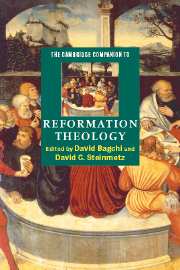Book contents
- Frontmatter
- Introduction
- 1 Late medieval theology
- 2 Lollardy
- 3 Hussite theology and the law of God
- 4 The theology of Erasmus
- 5 Luther
- 6 Melanchthon
- 7 Confessional Lutheran theology
- 8 The theology of Zwingli
- 9 Bucer
- 10 The theology of John Calvin
- 11 John Calvin and later Calvinism
- 12 The theology of Thomas Cranmer
- 13 The theology of the English reformers
- 14 The Scottish Reformation
- 15 An introduction to Anabaptist theology
- 16 Catholic theologians of the Reformation period before Trent
- 17 The Council of Trent
- Conclusion
- Select bibliography
- Index
- Series list
16 - Catholic theologians of the Reformation period before Trent
Published online by Cambridge University Press: 28 May 2006
- Frontmatter
- Introduction
- 1 Late medieval theology
- 2 Lollardy
- 3 Hussite theology and the law of God
- 4 The theology of Erasmus
- 5 Luther
- 6 Melanchthon
- 7 Confessional Lutheran theology
- 8 The theology of Zwingli
- 9 Bucer
- 10 The theology of John Calvin
- 11 John Calvin and later Calvinism
- 12 The theology of Thomas Cranmer
- 13 The theology of the English reformers
- 14 The Scottish Reformation
- 15 An introduction to Anabaptist theology
- 16 Catholic theologians of the Reformation period before Trent
- 17 The Council of Trent
- Conclusion
- Select bibliography
- Index
- Series list
Summary
It would be a mistake to suppose that all theologians who remained loyal to Rome during the first three decades of the Reformation were exclusively engaged in polemical activity against the 'new' gospel. For many academic theologians, perhaps for most, business would have gone on much as usual. But at the very least, especially for those in lands most affected, the religious upheavals altered fundamentally the context in which their theology was done. At the same time, their ranks were swelled considerably by those without academic appointments. Bishops, chaplains, members of religious orders lacking university connections - even kings, dukes, and lesser laypeople - all took up the pen in defence of traditional religion. For Catholics as much as for Protestants, theology became too important to be left to the divines.
The widely differing backgrounds of the Catholic controversialists alert us to the fact that their theological approaches differed as widely, and it is not surprising that the clamour of voices that would make themselves heard in the debates at Trent (Thomist and Dominican, Scotist and Franciscan, Augustinianist and Augustinian, to name but the loudest) could also be heard in earlier decades. It is no longer possible for us to speak of ‘pre- Tridentine Catholic theology’ in the singular, as Lämmer could in the middle of the nineteenth century; rather, we have to deal with a number of theologies and their exponents.
- Type
- Chapter
- Information
- The Cambridge Companion to Reformation Theology , pp. 220 - 232Publisher: Cambridge University PressPrint publication year: 2004



